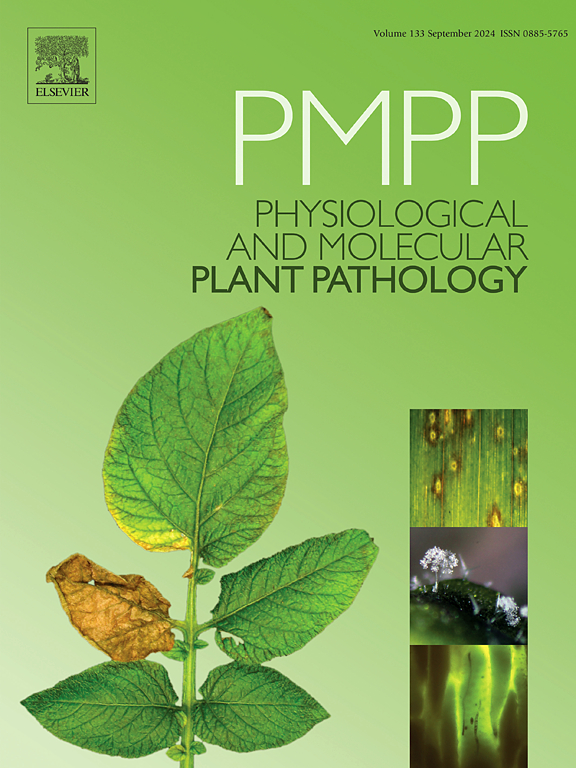Biochemistry behind stress-induced modulations of plant growth promoting rhizobacteria
IF 2.8
3区 农林科学
Q2 PLANT SCIENCES
引用次数: 0
Abstract
Biochemistry deals with how several metabolic pathways share their information through chemical, physical and biological means. In case of plants, the soil and soil residing microorganisms interact and help the plant to grow and develop as well as kill it. How these interactions take place helps to understand what kind of metabolite is involved. The basis of studying these biochemical interactions comes through metabolomics, proteomics, lipidomics, glycobiology and genomics. The complete understanding of the overall interactions taking place when a plant is undergoing stress will reveal the mechanisms of bio-molecular interactions with physical components involved. This will allow making shift towards plant's growth and vigour enabling productivity and ensuring food security. Among most of the known organisms to ensure plant health, the key ones are plant growth promoting rhizobacteria (PGPR). The current review focuses on how PGPRs interact with soil and plant and playing the beneficial role. The PGPRs not only modulate the plant by its own metabolites moreover, it accelerates the metabolic flow of various hormones present in plants and thus takes a lead on plant's metabolic system. The crucial information that PGPRs delivers to the plant makes the plant's survival possible in stress. However, the interaction is so complex that challenges remain like the genetic components along with their enzymatic and bio-molecular counterparts are not fully deciphered yet. The changing climatic conditions with an arising need for climate-resilient agriculture is dependent to a larger extent on PGPRs favouring the plants. Thereby, it becomes crucial to decipher the components involved. The current review also focuses on synergistic interactions of PGPRs and biotechnological innovations showing what progress in understanding the stress induced modulations of PGPRs to plants has been done by the scientific minds.
植物生长促进根瘤菌的胁迫诱导调节背后的生物化学
生物化学研究几种代谢途径如何通过化学、物理和生物手段共享它们的信息。在植物的情况下,土壤和土壤微生物相互作用,帮助植物生长和发育,以及杀死它。这些相互作用是如何发生的,有助于了解涉及到哪种代谢物。研究这些生物化学相互作用的基础是代谢组学、蛋白质组学、脂质组学、糖生物学和基因组学。全面了解植物在逆境中发生的相互作用,将揭示生物分子相互作用的物理机制。这将使我们能够转向植物的生长和活力,从而提高生产力并确保粮食安全。在大多数已知的保证植物健康的生物中,促进植物生长的根瘤菌(PGPR)是最重要的。本文主要综述了PGPRs与土壤和植物的相互作用及其发挥的有益作用。PGPRs不仅通过植物自身的代谢产物调节植物,而且加速植物体内各种激素的代谢流动,从而在植物的代谢系统中起主导作用。PGPRs传递给植物的关键信息使植物在逆境中生存成为可能。然而,相互作用是如此复杂,挑战仍然存在,就像遗传成分以及它们的酶和生物分子对应物还没有完全破译。气候条件的变化和对气候适应型农业需求的增加在更大程度上取决于有利于植物的pgpr。因此,破译所涉及的组件变得至关重要。目前的综述还侧重于PGPRs和生物技术创新的协同相互作用,显示了科学头脑在了解PGPRs对植物的胁迫诱导调节方面取得了哪些进展。
本文章由计算机程序翻译,如有差异,请以英文原文为准。
求助全文
约1分钟内获得全文
求助全文
来源期刊
CiteScore
4.30
自引率
7.40%
发文量
130
审稿时长
38 days
期刊介绍:
Physiological and Molecular Plant Pathology provides an International forum for original research papers, reviews, and commentaries on all aspects of the molecular biology, biochemistry, physiology, histology and cytology, genetics and evolution of plant-microbe interactions.
Papers on all kinds of infective pathogen, including viruses, prokaryotes, fungi, and nematodes, as well as mutualistic organisms such as Rhizobium and mycorrhyzal fungi, are acceptable as long as they have a bearing on the interaction between pathogen and plant.

 求助内容:
求助内容: 应助结果提醒方式:
应助结果提醒方式:


